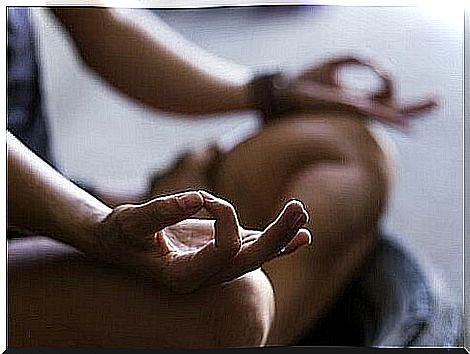8 Of The Myths About Mindfulness

Do you know the myths of mindfulness?
Mindfulness, or mindful presence, is a tool to become aware of our movement, our emotions and our reactions. All of these facets are crucial in life and the moments that make up our days. That’s why it’s so good for us; it helps us turn off the autopilot that we continue to follow for most of our days.
That said, mindfulness has in many ways become the “fashionable” thing to do and the answer to any problems you may have. But its origins are not at all what some might think.
There are many preconceived notions that prevent many people from enjoying the benefits. We will now go through 8 myths about mindfulness – read on and find out the truth.
Myths about mindfulness: It’s not just about focusing your mind
“Mindfulness” is often used to refer to what we know as meditation and breathing exercises. Its purpose, they say, is to control our wandering thoughts and to keep our minds focused. But this simplicity hides a background that is not so simple. If we go a little deeper, we will see that mindfulness is much more than this.
It comes from the Tibetan word drenpa , which means to remember, keep or collect . Therefore, it does not consist solely of observing our mind, but actually teaches us how to be aware of every moment of our lives, thus improving the quality of our thoughts.
Concentrating on the “here and now” is the way to do it. Doesn’t a tennis player have to improve by training for many hours on the tennis court? If so, why should we not teach our conscience to be more effective by practicing it?

Mindfulness is not psychological therapy
Neither meditation nor mindfulness are psychological therapies. Under no circumstances should they replace psychological treatment or medication. So if you have been diagnosed with a mental health disorder, you should always see a medical professional and follow their advice.
Relaxation and concentration exercises can complement treatment and medication, but not be a substitute. Therefore, it is wrong to think that they have “therapeutic effects”. A better term would be “regulatory effects”, as they do not remove anything from another treatment, but complement it.
You have to clear your mind if you want to meditate
One of the great myths about mindfulness is the idea that we must empty our minds to practice it. Nothing is further from the truth. In fact, emptying the mind is exactly what we should not do. We should instead lead it where we want it to go. In other words, master it. It’s about guiding our minds and not letting external stimuli do it for us.
Our brain is designed to think. Because of this, the more we try to ward off negative thoughts, the more intense they become. Blocking is a verb that completely goes against the philosophy of those who practice mindfulness. On the contrary, what they are trying to do is let everything flow; they release their thoughts.
Joy and positivism come from you
This is one of the great myths about mindfulness. The goal is to help you live in the present. But mindfulness is not synonymous with joy or positivism. By doing these exercises, you will not necessarily have a smile on your face all the time or see everything through rose-tinted glasses. Accept everything that comes to you, whether it is good or bad. It all depends on you.
We know that mindfulness will help you experience these moments more intensely. Both the good and the bad. It will help you experience the things that are happening to you better. You will be able to channel and manage your emotions better. It helps you not to make valuations and instead be more objective in your daily life.

To change your habits
Experts say anyone can change or start a 21-day habit. Unfortunately, this is not the case with mindfulness. One good thing is that you do not have to practice it every day or every week, because the benefits are immediate.
If you do it once a year, you will notice the same results as if you did it twice a day. You just need willpower. Of course, you need to know the right technique to perform it properly. It’s not just about going to a secluded place and breathing.
It takes too much time
Another of the big myths about mindfulness is easier to argue for: lack of time. There is always time, but there are also many excuses. It is often the case that it takes you longer to think about why you can not do it than to actually just do it.
You only need 10 or 15 minutes a day, plus the desire to focus. You can walk, feed, read… but you can still be focused on what’s going on in your life at all times. If you do this continuously, you will gradually see that you can meditate almost without noticing it.
It is a way of escaping reality
Many people believe that this meditation technique tries to isolate you from your life and help you get away from the stress of everyday life. But this is not true at all. What you are trying to do is reflect and try to find the source of the stress.
By giving it your full attention, you will be able to observe it and be aware of it. You should not try to get into a bubble and get away from reality. You should do the opposite: Try to shed light on your problem and focus all your attention on it.

Boring?
Of all the myths about mindfulness on our list today, this is the most common. People say it’s boring. But this is not the case. There are so many ways to do it… Do you really think that self-discovery can be called boring?
Maybe we should talk about fear instead of boredom. A fear of discovering what we would see if we only wanted to see inside ourselves. The unknown scares us. But even more so if it is about something that has caused pain at some point in our lives. It’s time for you to finally free yourself from all this. This is your moment!








